
Wonderful article from reporter Erin Brodwin of Business Insider discusses how to delete your DNA data from genetics companies like 23andMe and Ancestry.
The recent arrest in one of California’s most infamous serial-killer cases was based in large part on a DNA sample submitted to a genetics website by a distant relative of the suspect.
Brodwin writes that, naturally, the news may have you concerned about the security of your own genetic material. You may be wondering how to delete it from genetic databases kept by popular genetics testing companies like 23andMe and Ancestry.
Those two databases were not used by investigators to track down Golden State Killer suspect Joseph James DeAngelo. Instead, investigators used a service called GEDmatch, which lets customers upload a raw DNA signature. Investigators created a profile for the suspect using DNA sourced from a long-stored crime scene sample, and found matches between DeAngelo’s crime scene DNA and the DNA of a distant family member.
In her article, Brodwin writes that 23andMe, Ancestry, and Helix (National Geographic’s genetics service) only accept saliva samples for genetics testing — an easy way of obtaining DNA. But a similar company called Family Tree DNA could likely accept hair or blood, according to Joe Fox, an administrator for one of the company’s surname projects.
Whichever way a company gets your DNA, privacy advocates say there’s cause for concern. Although genetic data is ostensibly anonymized, companies can and do sell your data to third parties like pharmaceutical companies. From there, it could find its way elsewhere, advocates say.
The core service provided by most commercial genetic tests is built on the extraction of your DNA from your spit — that’s how you get the results about your health and ancestry information.
Here’s how to delete your data from a few of these services.
Deleting DNA Test Results from 23andMe.
After registering your spit sample online with 23andMe, the company will ask if you’d like your saliva to be stored or discarded. But you are not asked the same question about your raw genetic data — the DNA extracted from your spit.
Based on the wording of a document called the “Biobanking Consent Document,” it’s a bit unclear what happens to that raw DNA once you decide to have the company either store or toss your spit.
Here’s the statement’s exact language:
“By choosing to have 23andMe store either your saliva sample or DNA extracted from your saliva, you are consenting to having 23andMe and its contractors access and analyze your stored sample, using the same or more advanced technologies.”
That leaves a bit of a grey area as far as what 23andMe has the ability to keep, and how they can use your DNA information. If your spit or DNA sample is stored, the company can hold onto it for between one and 10 years, “unless we notify you otherwise,” the Biobanking Consent Document states.
Still, you can request that the company discard your spit. To do so, go to its Customer Care page, navigate to “Accounts and Registration,” scroll to the bottom of the bulleted list of options, and select the last bullet titled “Requesting Account Closure.”
Once there, you must submit a request to have your spit sample destroyed and/or have your account closed.
Deleting DNA Test Results from Ancestry.
If you want to delete your DNA test results with Ancestry, use the navigation bar at the top of the homepage to select “DNA.”
On the page with your name at the top, scroll to the upper right corner, select “Settings,” then go to “Delete Test Results” on the right side column.
According to the company’s latest privacy statement, doing this will result in the company deleting the following within 30 days: “All genetic information, including any derivative genetic information (ethnicity estimates, genetic relative matches, etc.) from our production, development, analytics, and research systems.”
But if you opted into Ancestry’s informed “Consent to Research” when you signed up, the company says it can’t wipe your genetic information from any “active or completed research projects.” It will, however, prevent your DNA from being used for new research.
To have the company discard your spit sample, you must call Member Services and request that it be thrown out.
Deleting DNA Test Results From Helix.
In its most recently updated Privacy Policy, Helix states that it may “store your DNA indefinitely.” It also keeps your saliva sample, but you can request that it be destroyed by contacting Helix’s Customer Care via a request form that looks similar to 23andMe’s.
My opinion? Thankfully, the police conducted lawful and highly intelligent investigations leading up to the capture of the Golden State Killer. They should be congratulated. And these highly remarkable techniques remind us that the information we share with the world can be accessed anywhere, any time, by the authorities. Like Brodwin mentions, companies can and do sell your data to third parties like pharmaceutical companies. From there, it could find its way elsewhere.
Please contact my office if you, a friend or family member face criminal charges involving the authorities accessing DNA. If the search was unlawful, then the evidence can be suppressed. Hiring a competent defense counsel who is familiar with search and seizure law is the first and best step toward getting criminal charges reduced or dismissed.















